Background
His father's income as a customhouse clerk meant a frugal way of life for the large family, but not poverty. Although Henry's formal education ended before he was 14, it was not as deficient as it may sound.

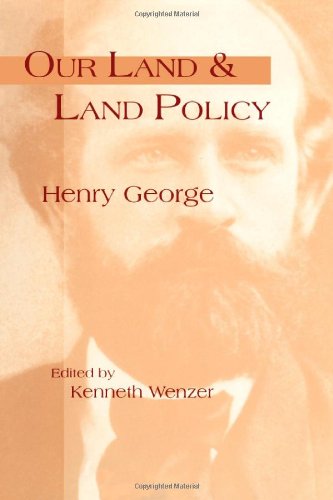
( Even before the publication of Progress and Poverty in ...)
Even before the publication of Progress and Poverty in 1879, San Francisco political economist and publisher Henry George (1839-1897) had written extensively about what he considered to be the causes for worldwide economic inequity—land monopolization and speculation by wealthy entrepreneurs and corrupt politicians. But his attacks on these evils were coupled with a plan for a possible brighter future, for a world in which disparities between people of different classes could be adjusted. By the time he died in 1897, his assessments of liberal 19th-century economic theory were critically acclaimed in Europe and the United States. Michigan State University Press's new edition of Our Land and Land Policy includes the texts of speeches George delivered and essays he published during three decades of political activism. These pieces were chosen originally in 1901 by George's son, Henry George, Jr., to portray the expansiveness and depth of his father's philosophy and the sincerity with which the elder George struggled throughout his life for social justice.
http://www.amazon.com/gp/product/0870135228/?tag=2022091-20
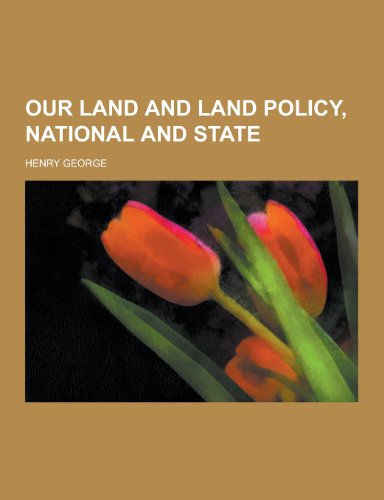
(This historic book may have numerous typos and missing te...)
This historic book may have numerous typos and missing text. Purchasers can usually download a free scanned copy of the original book (without typos) from the publisher. Not indexed. Not illustrated. 1871 edition. Excerpt: ... over estimated it, and for an obvious reason. A trne statement of the real value of the grant would tend to discredit the whole affair in the eyes of the cautious foreign capitalists, from whom the Company seeks to borrow money, for they would not believe that any Government could be extravagant enough to make such a donation. But it must be remembered that the line of the Northern Pacific passes for nearly its whole length through as fine an agricultural country as that of Illinois; that its grant consists, in large part, of immensely valuable timber and mineral land, and that it will build up town after town, one of them at least, a great commercial city, on its own soil. Furthermore, for reasons before stated, the increase in the value of land during the next twenty years must be much greater than it has been in the last twenty years. Taking these things into consideration, is it too much to say that in twenty years from now the lands of the Company will have sold for or will be worth an average of at least $20 per acre? At this rate the grant amounts to over half a million dollars per mile, or in the aggregate to the enormous sum of $1,160,000,000--a sum more than half the National debt. This donated absolutely to one corporation. And for what? For building a road which cannot cost more than eighty millions, and for building it for themselves! No keener satire upon our land grant policy could be written than that which is to be found in the published advertisement of this Northern Pacific Company. The Directors show that if they get an average of but $2 per acre for their land, they can pay the whole cost of building and equipping the road and have a surplus of some $20,000,000 left. That is to say, the Government might have built...
http://www.amazon.com/gp/product/123044470X/?tag=2022091-20
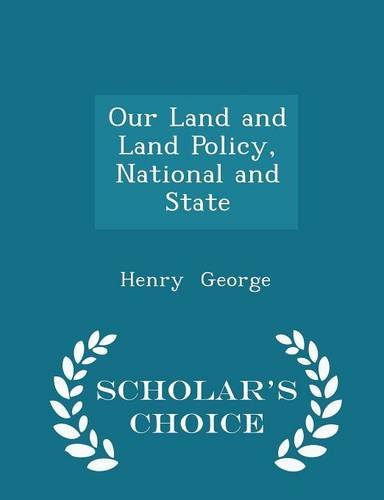
( This work has been selected by scholars as being cultur...)
This work has been selected by scholars as being culturally important, and is part of the knowledge base of civilization as we know it. This work was reproduced from the original artifact, and remains as true to the original work as possible. Therefore, you will see the original copyright references, library stamps (as most of these works have been housed in our most important libraries around the world), and other notations in the work. This work is in the public domain in the United States of America, and possibly other nations. Within the United States, you may freely copy and distribute this work, as no entity (individual or corporate) has a copyright on the body of the work. As a reproduction of a historical artifact, this work may contain missing or blurred pages, poor pictures, errant marks, etc. Scholars believe, and we concur, that this work is important enough to be preserved, reproduced, and made generally available to the public. We appreciate your support of the preservation process, and thank you for being an important part of keeping this knowledge alive and relevant.
http://www.amazon.com/gp/product/1298131642/?tag=2022091-20
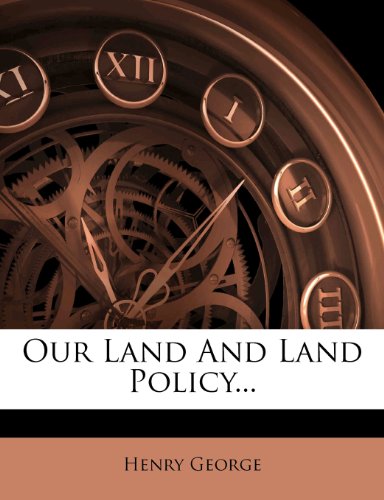
( This is a reproduction of a book published before 1923....)
This is a reproduction of a book published before 1923. This book may have occasional imperfections such as missing or blurred pages, poor pictures, errant marks, etc. that were either part of the original artifact, or were introduced by the scanning process. We believe this work is culturally important, and despite the imperfections, have elected to bring it back into print as part of our continuing commitment to the preservation of printed works worldwide. We appreciate your understanding of the imperfections in the preservation process, and hope you enjoy this valuable book. ++++ The below data was compiled from various identification fields in the bibliographic record of this title. This data is provided as an additional tool in helping to ensure edition identification: ++++ Our Land And Land Policy Henry George Doubleday, Page & company, 1912 Law; Land Use; Law / Land Use; Public lands; Single tax
http://www.amazon.com/gp/product/127196953X/?tag=2022091-20
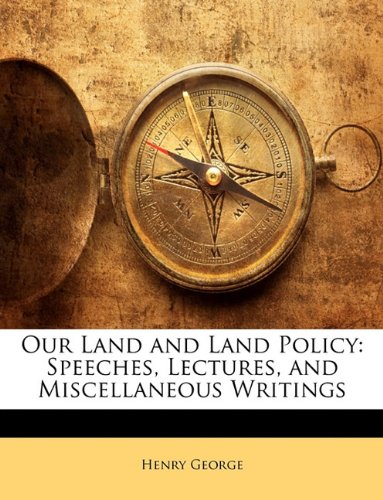
(This is a reproduction of a book published before 1923. T...)
This is a reproduction of a book published before 1923. This book may have occasional imperfections such as missing or blurred pages, poor pictures, errant marks, etc. that were either part of the original artifact, or were introduced by the scanning process. We believe this work is culturally important, and despite the imperfections, have elected to bring it back into print as part of our continuing commitment to the preservation of printed works worldwide. We appreciate your understanding of the imperfections in the preservation process, and hope you enjoy this valuable book.
http://www.amazon.com/gp/product/1142939308/?tag=2022091-20

(This book was originally published prior to 1923, and rep...)
This book was originally published prior to 1923, and represents a reproduction of an important historical work, maintaining the same format as the original work. While some publishers have opted to apply OCR (optical character recognition) technology to the process, we believe this leads to sub-optimal results (frequent typographical errors, strange characters and confusing formatting) and does not adequately preserve the historical character of the original artifact. We believe this work is culturally important in its original archival form. While we strive to adequately clean and digitally enhance the original work, there are occasionally instances where imperfections such as blurred or missing pages, poor pictures or errant marks may have been introduced due to either the quality of the original work or the scanning process itself. Despite these occasional imperfections, we have brought it back into print as part of our ongoing global book preservation commitment, providing customers with access to the best possible historical reprints. We appreciate your understanding of these occasional imperfections, and sincerely hope you enjoy seeing the book in a format as close as possible to that intended by the original publisher.
http://www.amazon.com/gp/product/B00A8P626I/?tag=2022091-20
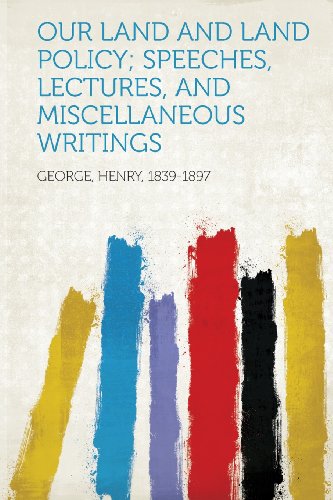
(Unlike some other reproductions of classic texts (1) We h...)
Unlike some other reproductions of classic texts (1) We have not used OCR(Optical Character Recognition), as this leads to bad quality books with introduced typos. (2) In books where there are images such as portraits, maps, sketches etc We have endeavoured to keep the quality of these images, so they represent accurately the original artefact. Although occasionally there may be certain imperfections with these old texts, we feel they deserve to be made available for future generations to enjoy.
http://www.amazon.com/gp/product/1313467065/?tag=2022091-20
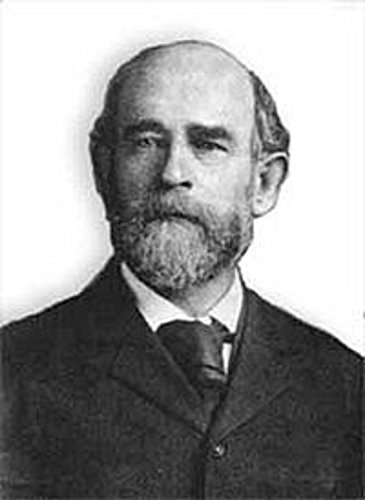
(The book has an active table of contents for reads to eas...)
The book has an active table of contents for reads to easy access to each chapter. Henry George’s analysis and remedy are directly from classical economic theory seeded by Adam Smith, David Ricardo, and John Stuart Mill. The giants had already decried the evils of concentrated land ownership, which they called “land monopoly”. George carried classical economics to its logical conclusion, and popularized that conclusion with stunning effect. Henry George is best known for his Progress and Poverty that Albert Einstein designated George a "beautiful combination of intellectual keenness, artistic forum, and fervent love of justice". However, Protection or Free Trade by Henry George is a more significant work on the nature of free trade. Even before the publication of Progress and Poverty in 1877, Henry George published Our Land and Land Policy in 1870. This was the first book that Henry George developed the philosophy and economic ideology known as Georgism. He argued that everyone owns what he or she creates. However, everything found in nature including land belongs equally to all humanity. Henry George had written extensively in this book about what he considered to be the causes for worldwide economic inequity; land monopolization and speculation by wealthy entrepreneurs and corrupt politicians. But Henry George was optimistic with a solution for a possible brighter future, for a world in which disparities between people of different classes could be adjusted. His solution with a single tax on land is still relevant to daily life of millions of Americans and his theory for land tax is the great theoretical foundation for the knowledge based economic system of America today. This book is for the readers who are interested in the pioneer work and essential thoughts of land value pioneered by Henry George, one of the greatest American economists.
http://www.amazon.com/gp/product/B00D30B4MM/?tag=2022091-20
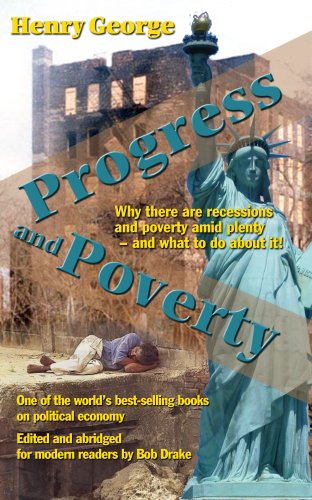
(Why There Are Recessions And Poverty Amid Plenty- And Wha...)
Why There Are Recessions And Poverty Amid Plenty- And What To Do About It! One of the world's best-selling books on political economy edited and abridged for modern readers. Many economists and politicians foster the illusion that great fortunes and poverty stem from the presence or absence of individual skill and risk-taking. Henry George, by contrast, showed that the wealth gap occurs because a few people are allowed to monopolize natural opportunities and deny them to others. George did not advocate equality of income, the forcible redistribution of wealth, or government management of the economy. He simply believed that in a society not burdened by the demands of a privileged elite, a full and satisfying life would be attainable by everyone.
http://www.amazon.com/gp/product/0911312986/?tag=2022091-20
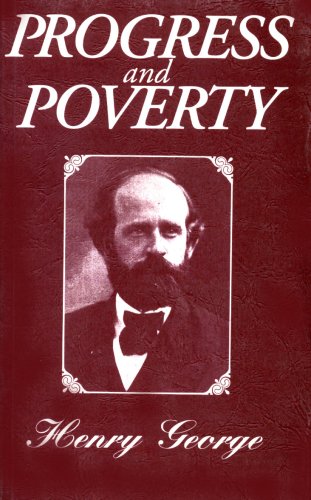
(This classic work is an enquiry into the cause of industr...)
This classic work is an enquiry into the cause of industrial depressions and the persistence of poverty amid advancing wealth. Published in 1879, it was admired and advocated by great minds such as Albert Einstein, Winston Churchill, Leo Tolstoy and Sun Yat-sen in China. Henry George lived through a period of American history which witnessed the closing of the frontier, and he noticed the dramatic deterioration in the condition of labour once that happened. While land was freely available wages were high, once it was enclosed wages fell. Adam Smith appears not to have appreciated the full consequences of this, but he was writing before their full horror became evident in the form of landless peasants crowding into city slums, seeking work in "satanic mills" at minimum wages. Henry George, observing similar events in America (he was a journalist), saw the connection between land enclosure and poverty and unemployment. He also realized that the harmful effects could be rectified, without confiscating the land, through a change in the tax system and allowing market forces to work. This classic offers an alternative ethical and practical guide at a time when the collapse of the Marxist/Socialist experiment and the deep recession in the West leave many seeking fresh inspiration.
http://www.amazon.com/gp/product/0911312587/?tag=2022091-20
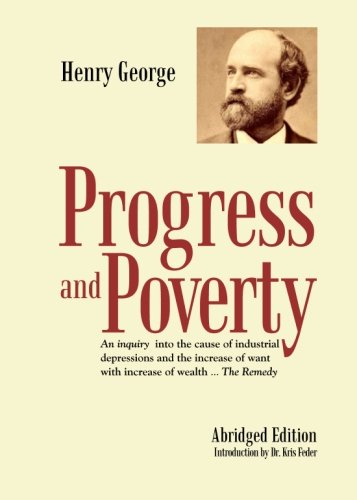
(An Inquiry Into the Cause of Industrial Depressions and o...)
An Inquiry Into the Cause of Industrial Depressions and of Increase of Want With Increase of Wealth...the Remedy Henry George believed that "(t)he people must think because the people alone can act." This classic bestseller in political economy launched a worldwide movement with a unique strategy to abolish privilege and poverty. Many economists and politicians foster the illusion that great fortunes and poverty stem from the presence or absence of individual skill and risk-taking. Henry George, by contrast, showed that the wealth gap occurs because a few people are allowed to monopolize natural opportunities and deny them to others. George did not advocate equality of income, the forcible redistribution of wealth, or government management of the economy. He simply believed that in a society not burdened by the demands of a privileged elite, a full and satisfying life would be attainable by everyone. (Originally published in 1879.) Abridged version.
http://www.amazon.com/gp/product/0911312102/?tag=2022091-20
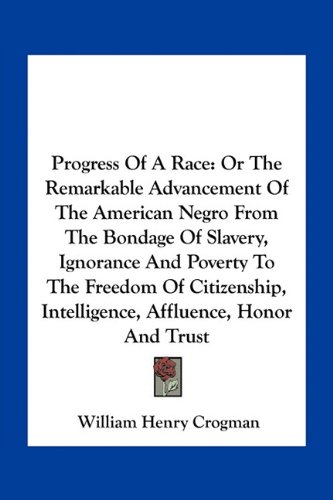
(This scarce antiquarian book is a facsimile reprint of th...)
This scarce antiquarian book is a facsimile reprint of the original. Due to its age, it may contain imperfections such as marks, notations, marginalia and flawed pages. Because we believe this work is culturally important, we have made it available as part of our commitment for protecting, preserving, and promoting the world's literature in affordable, high quality, modern editions that are true to the original work.
http://www.amazon.com/gp/product/1163799564/?tag=2022091-20
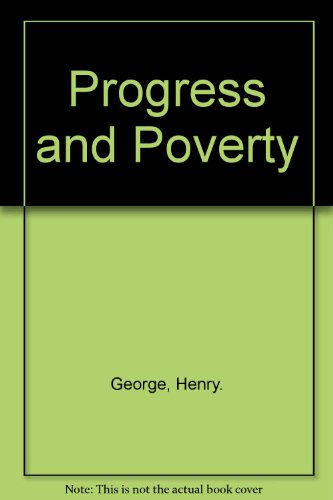
(This scarce antiquarian book is a facsimile reprint of th...)
This scarce antiquarian book is a facsimile reprint of the original. Due to its age, it may contain imperfections such as marks, notations, marginalia and flawed pages. Because we believe this work is culturally important, we have made it available as part of our commitment for protecting, preserving, and promoting the world's literature in affordable, high quality, modern editions that are true to the original work.
http://www.amazon.com/gp/product/0914016601/?tag=2022091-20
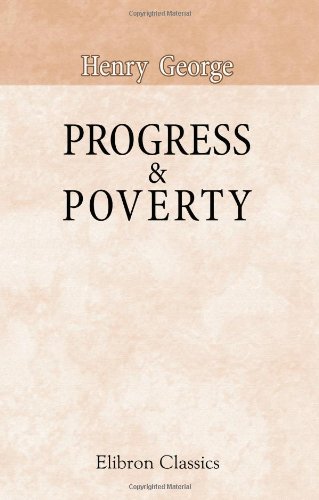
(This Elibron Classics book is a facsimile reprint of a 18...)
This Elibron Classics book is a facsimile reprint of a 1894 edition by William Reeves, London.
http://www.amazon.com/gp/product/0543975428/?tag=2022091-20

(An annotated version of the classic economic text with up...)
An annotated version of the classic economic text with updates and additions from Carl F Shaw. This edition is black and white, lacking in color photos and graphs.
http://www.amazon.com/gp/product/1511811730/?tag=2022091-20
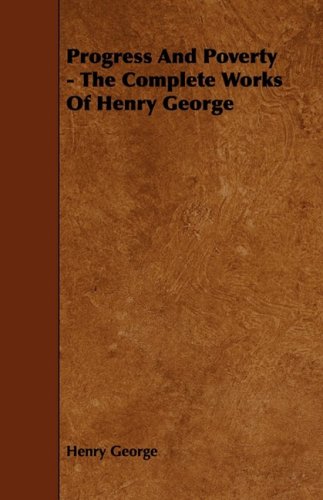
(Many of the earliest books, particularly those dating bac...)
Many of the earliest books, particularly those dating back to the 1900s and before, are now extremely scarce and increasingly expensive. We are republishing these classic works in affordable, high quality, modern editions, using the original text and artwork.
http://www.amazon.com/gp/product/1443771392/?tag=2022091-20
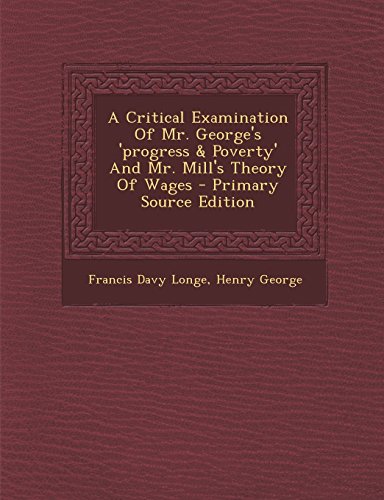
( This is a reproduction of a book published before 1923....)
This is a reproduction of a book published before 1923. This book may have occasional imperfections such as missing or blurred pages, poor pictures, errant marks, etc. that were either part of the original artifact, or were introduced by the scanning process. We believe this work is culturally important, and despite the imperfections, have elected to bring it back into print as part of our continuing commitment to the preservation of printed works worldwide. We appreciate your understanding of the imperfections in the preservation process, and hope you enjoy this valuable book. ++++ The below data was compiled from various identification fields in the bibliographic record of this title. This data is provided as an additional tool in helping to ensure edition identification: ++++ A Critical Examination Of Mr. George's 'Progress & Poverty' And Mr. Mill's Theory Of Wages Francis Davy Longe, Henry George Simpkin & Marshall, 1883 Business & Economics; Economics; Theory; Business & Economics / Economics / Theory
http://www.amazon.com/gp/product/1293550027/?tag=2022091-20
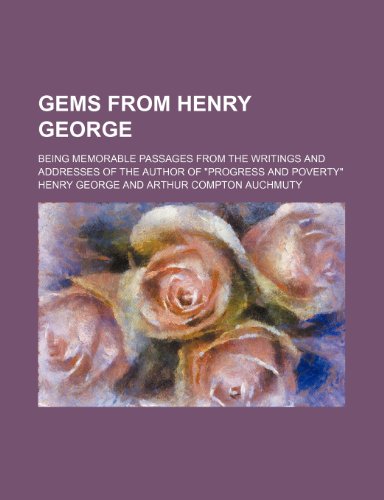
(This historic book may have numerous typos and missing te...)
This historic book may have numerous typos and missing text. Purchasers can download a free scanned copy of the original book (without typos) from the publisher. Not indexed. Not illustrated. 1908 Excerpt: ...is something like substantial equality in the distribution of wealth, we cannot expect pure government.--P. F. T. J/f/E should keep our own market for our own ' producers, seems by many to be regarded as the same kind of a proposition as, We should keep our own pasture for our own cows; whereas, in truth, it is such a proposition as, We should keep our own appetites for our own cookery, or, We should keep our own transportation for our own legs,--P. F. T. 'T'HE protection of the masses has in all times been the pretence of tyranny--the plea of monarchy, of aristocracy, of special privilege of every kind. The slave owners justified slavery as protecting the slaves. British misrule in Ireland is upheld on the ground that it is for the protection of the Irish. But, whether under a monarchy or under a republic, is there an instance in the history of the world in which the "protection " of the labouring masses has not meant their oppression? The protection that those who have got the law-making power into their hands have given labour, has at best always been the protection that man gives to cattle--he protects them that he may use and eat them.--P. F. T. IT is never intimated that the land-owner or the capitalist needs protection. They, it is always assumed, can take care of themselves. It is only the poor workingman who must be protected. What is labour that it should so need protection? Is not labour the creator of capital, the producer of all wealth? Is it not the men who labour that feed and clothe all others? Is it not true, as has been said, that the three great orders of society are " workingmen, beggarmen, and thieves?" How, then, does it come that workingmen alone need protection?--P. F. T, the government of a country which should c...
http://www.amazon.com/gp/product/1231345535/?tag=2022091-20

( Is My Cat Crazy? If only it were that simple! But the...)
Is My Cat Crazy? If only it were that simple! But the fact is that your cat is very sensible indeed—about cat things. She knows how to scratch upright surfaces, cough up hairballs, send messages with her pee, and party all night. To the feline mind, these are the stuff of everyday life—as important as sleeping all day and grooming for several hours using nothing but your tongue. Your clever kitty knows you very well (after all, she sits and stares at you when you're in the bathroom). But how well do you know her? Find out why cats knead against us, the best way to hold a cat, how cats can jump onto your kitchen counters without even a running start, why they chew on your sweaters. Award-winning pet experts Dr. Marty Becker and Gina Spadafori explain the ins and outs of the feline psyche. Because the better you understand cats, the easier it is to love the kitty on your couch. Can you teach an old cat new tricks? You bet! Expecting a baby? It's perfectly okay to keep your cat. What about kittens? You'll find everything you always wanted to know about feline sex but were afraid to ask. Your cat's not crazy, but she can be mysterious. Did you know cats can tell time? They talk with their tails and walk on their toes. And there are even rumors that some cats are descendents of space aliens. It's no wonder the ancient Egyptians were not the only ones who worshipped them. You'll also find the answers to questions that tend to tickle your curiosity: Why do cats' eyes glow in the dark? What's in catnip that makes kitties so silly? Can curiosity really kill a cat? You've got questions? This book's got answers. Do cats always land on their feet? Find out!
http://www.amazon.com/gp/product/0757305733/?tag=2022091-20

( Is My Cat Crazy? If only it were that simple! But the...)
Is My Cat Crazy? If only it were that simple! But the fact is that your cat is very sensible indeed—about cat things. She knows how to scratch upright surfaces, cough up hairballs, send messages with her pee, and party all night. To the feline mind, these are the stuff of everyday life—as important as sleeping all day and grooming for several hours using nothing but your tongue. Your clever kitty knows you very well (after all, she sits and stares at you when you're in the bathroom). But how well do you know her? Find out why cats knead against us, the best way to hold a cat, how cats can jump onto your kitchen counters without even a running start, why they chew on your sweaters. Award-winning pet experts Dr. Marty Becker and Gina Spadafori explain the ins and outs of the feline psyche. Because the better you understand cats, the easier it is to love the kitty on your couch. Can you teach an old cat new tricks? You bet! Expecting a baby? It's perfectly okay to keep your cat. What about kittens? You'll find everything you always wanted to know about feline sex but were afraid to ask. Your cat's not crazy, but she can be mysterious. Did you know cats can tell time? They talk with their tails and walk on their toes. And there are even rumors that some cats are descendents of space aliens. It's no wonder the ancient Egyptians were not the only ones who worshipped them. You'll also find the answers to questions that tend to tickle your curiosity: Why do cats' eyes glow in the dark? What's in catnip that makes kitties so silly? Can curiosity really kill a cat? You've got questions? This book's got answers. Do cats always land on their feet? Find out!
http://www.amazon.com/gp/product/0757305733/?tag=2022091-20
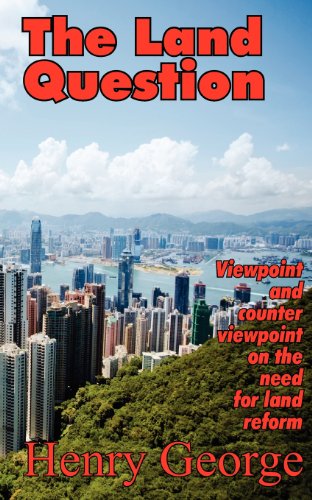
(Viewpoint and Counterviewpoint on the Need for Land Refor...)
Viewpoint and Counterviewpoint on the Need for Land Reform This new edition of the 1884 original brings together these important writings of Henry George: his famous essay on the Irish land question, his response to Scottish Duke of Argyll's critique, and his incisive analysis of Pope Leo XIII's influential encyclical, Rerum Novarum. (The full text of papal encyclical is also included.)
http://www.amazon.com/gp/product/0911312404/?tag=2022091-20
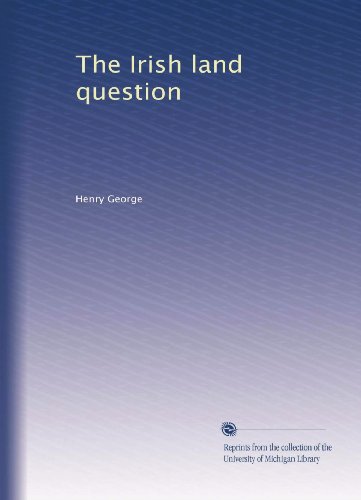
(This book, "The Land Question. What it Involves, and how ...)
This book, "The Land Question. What it Involves, and how Alone it Can be Settled", by Henry George, is a replication of a book originally published before 1881. It has been restored by human beings, page by page, so that you may enjoy it in a form as close to the original as possible. This book was created using print-on-demand technology. Thank you for supporting classic literature.
http://www.amazon.com/gp/product/B002YT8GC4/?tag=2022091-20
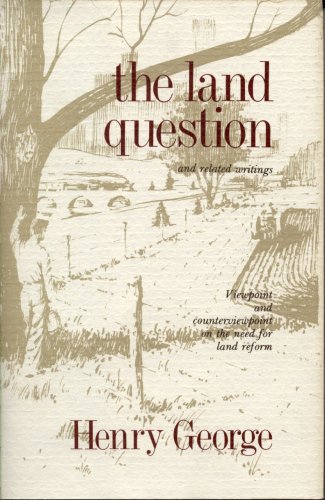
(Henry George challenges British philosopher Herbert Spenc...)
Henry George challenges British philosopher Herbert Spencer's deletion of the Social Statics chapter, The Right to the Use of the Earth. George includes this controversial chapter in which Spencer supports equal liberty and contrasts it to Spencer's later writings in support of Social Darwinism.
http://www.amazon.com/gp/product/0911312595/?tag=2022091-20

(This scarce antiquarian book is a facsimile reprint of th...)
This scarce antiquarian book is a facsimile reprint of the original. Due to its age, it may contain imperfections such as marks, notations, marginalia and flawed pages. Because we believe this work is culturally important, we have made it available as part of our commitment for protecting, preserving, and promoting the world's literature in affordable, high quality, modern editions that are true to the original work.
http://www.amazon.com/gp/product/0404028039/?tag=2022091-20
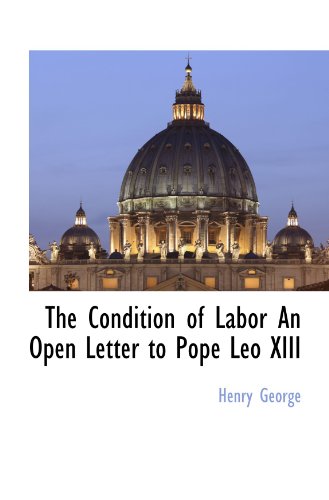
(The Shelf2Life Catholic Studies Collection is a unique co...)
The Shelf2Life Catholic Studies Collection is a unique collection of pre-1923 titles focusing on the history, culture and practice of Catholicism. From antique editions of traditional prayers, accounts of important church events and biographies of adherents, to descriptions of specific Roman Catholic missions and dioceses, this collection provides an opportunity to rediscover the culture and experience of Roman Catholicism around the turn of the 20th century and earlier. By presenting these volumes scanned from their original form, historians, religious scholars and all those interested can now glimpse the beauty and elegance of the original illustrations and typesetting in these volumes, as well as explore the views and visions expressed in these writings. The Roman Catholic Church is a modern institution with a long and interesting history, and the Catholic Studies Collection provides an important tool to understanding the Church's spirit, history and culture into the early 20th century.
http://www.amazon.com/gp/product/1113317914/?tag=2022091-20

(Henry George challenges British philosopher Herbert Spenc...)
Henry George challenges British philosopher Herbert Spencer's deletion of the Social Statics chapter, The Right to the Use of the Earth. George includes this controversial chapter in which Spencer supports equal liberty and contrasts it to Spencer's later writings in support of Social Darwinism.
http://www.amazon.com/gp/product/0911312595/?tag=2022091-20
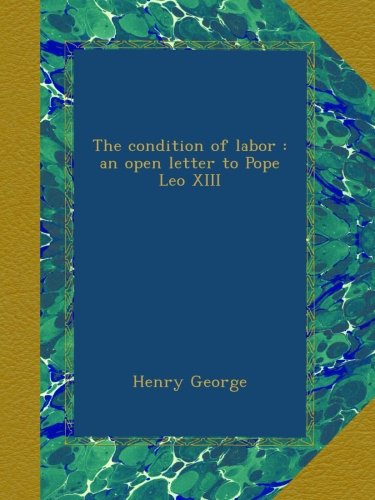
(This book was originally published prior to 1923, and rep...)
This book was originally published prior to 1923, and represents a reproduction of an important historical work, maintaining the same format as the original work. While some publishers have opted to apply OCR (optical character recognition) technology to the process, we believe this leads to sub-optimal results (frequent typographical errors, strange characters and confusing formatting) and does not adequately preserve the historical character of the original artifact. We believe this work is culturally important in its original archival form. While we strive to adequately clean and digitally enhance the original work, there are occasionally instances where imperfections such as blurred or missing pages, poor pictures or errant marks may have been introduced due to either the quality of the original work or the scanning process itself. Despite these occasional imperfections, we have brought it back into print as part of our ongoing global book preservation commitment, providing customers with access to the best possible historical reprints. We appreciate your understanding of these occasional imperfections, and sincerely hope you enjoy seeing the book in a format as close as possible to that intended by the original publisher.
http://www.amazon.com/gp/product/B00ASCKMQW/?tag=2022091-20
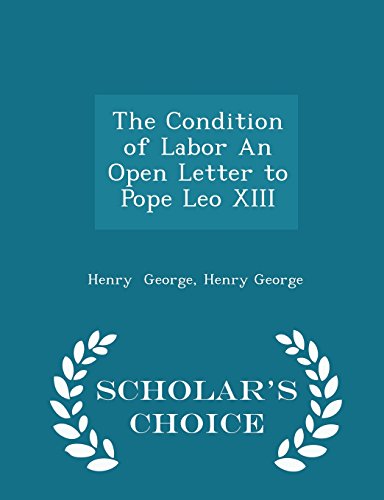
( This work has been selected by scholars as being cultur...)
This work has been selected by scholars as being culturally important, and is part of the knowledge base of civilization as we know it. This work was reproduced from the original artifact, and remains as true to the original work as possible. Therefore, you will see the original copyright references, library stamps (as most of these works have been housed in our most important libraries around the world), and other notations in the work. This work is in the public domain in the United States of America, and possibly other nations. Within the United States, you may freely copy and distribute this work, as no entity (individual or corporate) has a copyright on the body of the work. As a reproduction of a historical artifact, this work may contain missing or blurred pages, poor pictures, errant marks, etc. Scholars believe, and we concur, that this work is important enough to be preserved, reproduced, and made generally available to the public. We appreciate your support of the preservation process, and thank you for being an important part of keeping this knowledge alive and relevant.
http://www.amazon.com/gp/product/1295963639/?tag=2022091-20
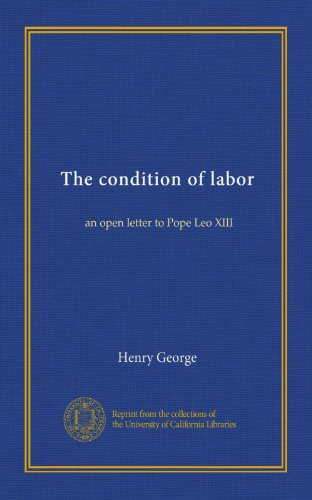
(This book was digitized and reprinted from the collection...)
This book was digitized and reprinted from the collections of the University of California Libraries. Together, the more than one hundred UC Libraries comprise the largest university research library in the world, with over thirty-five million volumes in their holdings. This book and hundreds of thousands of others can be found online in the HathiTrust Digital Library.HP's patented BookPrep technology was used to clean artifacts resulting from use and digitization, improving your reading experience.
http://www.amazon.com/gp/product/B0067FBA24/?tag=2022091-20
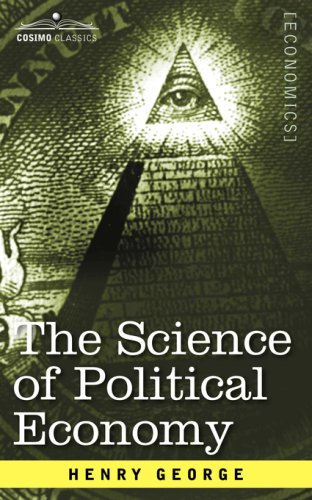
(Economist HENRY GEORGE (1839-1897) was, at the height of ...)
Economist HENRY GEORGE (1839-1897) was, at the height of his popularity in the 1880s and 1890s, considered the third most famous American, behind Mark Twain and Thomas Edison, and his liberal philosophies on taxation, copyrights, poverty issues, and more continue to influence progressive movements today. This is George's grand overview of the science and philosophy of economics, from the largest question-what do we mean by "civilization"?-to the most specific: what is the difference between money and wealth? A replica of a manuscript written in the 1890s and unpublished at the author's death, this remains a vital resource for anyone wishing to understand economics from a financial, legal, and even moral perspective. ALSO FROM COSIMO: George's Progress and Poverty, The Condition of Labor, A Perplexed Philosopher, Protection or Free Trade, and Social Problems
http://www.amazon.com/gp/product/1596059788/?tag=2022091-20
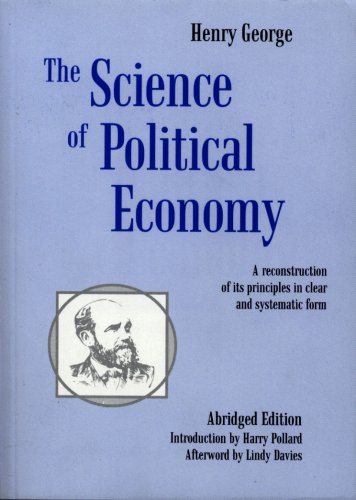
(A modern abridgement of George's last and, according to s...)
A modern abridgement of George's last and, according to some, most important book. Here George develops his theory of value and critically examines the writings of economists, past and contemporaneous.
http://www.amazon.com/gp/product/091131248X/?tag=2022091-20
His father's income as a customhouse clerk meant a frugal way of life for the large family, but not poverty. Although Henry's formal education ended before he was 14, it was not as deficient as it may sound.
George began as a Lincoln Republican, but then became a Democrat. He was a strong critic of railroad and mining interests, corrupt politicians, land speculators, and labor contractors. He first articulated his views in a 1868 article entitled "What the Railroad Will Bring Us." George argued that the boom in railroad construction would only benefit the lucky few who owned interests in the railroads and other related enterprises, while throwing the greater part of the population into abject poverty. This had led to him earning the enmity of the Central Pacific Railroad's executives, who helped defeat his bid for election to the California State Assembly.
One day during 1871 George went for a horseback ride and stopped to rest while overlooking San Francisco Bay. He later wrote of the revelation that he had: "I asked a passing teamster, for want of something better to say, what land was worth there. He pointed to some cows grazing so far off that they looked like mice, and said, 'I don't know exactly, but there is a man over there who will sell some land for a thousand dollars an acre.' Like a flash it came over me that there was the reason of advancing poverty with advancing wealth. With the growth of population, land grows in value, and the men who work it must pay more for the privilege."
Furthermore, on a visit to New York City, he was struck by the apparent paradox that the poor in that long-established city were much worse off than the poor in less developed California. These observations supplied the theme and title for his 1879 book Progress and Poverty, which was a great success, selling over 3 million copies. In it George made the argument that a sizeable portion of the wealth created by social and technological advances in a free market economy is possessed by land owners and monopolists via economic rents, and that this concentration of unearned wealth is the main cause of poverty. George considered it a great injustice that private profit was being earned from restricting access to natural resources while productive activity was burdened with heavy taxes, and indicated that such a system was equivalent to slavery—a concept somewhat similar to wage slavery. This is also the work in which he made the case for a "land tax" in which governments would tax the value of the land itself, thus preventing private interests from profiting upon its mere possession, but allowing the value of all improvements made to that land to remain with investors.
George was in a position to discover this pattern, having experienced poverty himself, knowing many different societies from his travels, and living in California at a time of rapid growth. In particular he had noticed that the construction of railroads in California was increasing land values and rents as fast or faster than wages were rising.
During 1880, now a popular writer and speaker, George moved to New York City, becoming closely allied with the Irish nationalist community despite being of English ancestry. From there he made several speaking journeys abroad to places such as Ireland and Scotland where access to land was (and still is) a major political issue. During 1886 George campaigned for mayor of New York City as the candidate of the United Labor Party, the short-lived political society of the Central Labor Union. He polled second, more than the Republican candidate Theodore Roosevelt. The election was won by Tammany Hall candidate Abram Stevens Hewitt by what many of George's supporters believed was fraud. In the 1887 New York state elections George came in a distant third in the election for Secretary of State of New York. The United Labor Party was soon weakened by internal divisions: the management was essentially Georgist, but as a party of organized labor it also included some Marxist members who did not want to distinguish between land and capital, many Catholic members who were discouraged by the excommunication of Father Edward McGlynn, and many who disagreed with George's free trade policy. George had particular trouble with Terrence V. Powderly, president of the Knights of Labor, a key member of the United Labor coalition. While initially friendly with Powderly, George vigorously opposed the tariff policies which Powderly and many other labor leaders thought vital to the protection of American workers. George's strident criticism of the tariff set him against Powderly and others in the labor movement.
(Viewpoint and Counterviewpoint on the Need for Land Refor...)
( Even before the publication of Progress and Poverty in ...)
(Economist HENRY GEORGE (1839-1897) was, at the height of ...)
(Why There Are Recessions And Poverty Amid Plenty- And Wha...)
(Unlike some other reproductions of classic texts (1) We h...)
(This book was originally published prior to 1923, and rep...)
(This book was originally published prior to 1923, and rep...)
(The Shelf2Life Catholic Studies Collection is a unique co...)
(Many of the earliest books, particularly those dating bac...)
(Henry George challenges British philosopher Herbert Spenc...)
(Henry George challenges British philosopher Herbert Spenc...)
( This work has been selected by scholars as being cultur...)
( This work has been selected by scholars as being cultur...)
(This classic work is an enquiry into the cause of industr...)
( Is My Cat Crazy? If only it were that simple! But the...)
( Is My Cat Crazy? If only it were that simple! But the...)
(This book was digitized and reprinted from the collection...)
(An Inquiry Into the Cause of Industrial Depressions and o...)
(This Elibron Classics book is a facsimile reprint of a 18...)
(An annotated version of the classic economic text with up...)
(Millions of copies have influenced generations of people ...)
(The book has an active table of contents for reads to eas...)
(A modern abridgement of George's last and, according to s...)
(This scarce antiquarian book is a facsimile reprint of th...)
(This scarce antiquarian book is a facsimile reprint of th...)
(This scarce antiquarian book is a facsimile reprint of th...)
(This historic book may have numerous typos and missing te...)
(This historic book may have numerous typos and missing te...)
( This is a reproduction of a book published before 1923....)
(This is a reproduction of a book published before 1923. T...)
( This is a reproduction of a book published before 1923....)
(This book, "The Land Question. What it Involves, and how ...)
(Fiftieth Anniversary Edition. Hardcover. An Inquiry Into ...)
(Lang:- English, Pages 365. Reprinted in 2015 with the hel...)
(Lang:- English, Pages 177. Reprinted in 2015 with the hel...)
(Lang:- English, Pages 177. Reprinted in 2015 with the hel...)
(Lang:- English, Pages 418. Reprinted in 2015 with the hel...)
(Lang:- English, Pages 201. Reprinted in 2015 with the hel...)
(Lang:- English, Pages 57. Reprinted in 2015 with the help...)
(Book by Ferman, Louis A., Henry, Stuart)
(Book by Henry George)
Henry George is best known for his argument that the economic rent of land should be shared by society rather than being owned privately. The clearest statement of this view is found in Progress and Poverty: "We must make land common property." By taxing land values, society could recapture the value of its common inheritance, and eliminate the need for taxes on productive activity. George believed that this would provide disincentives toward land speculation, but would continue to incentivize development, as landlords would not suffer tax penalties for any industry or edifice constructed on their land.
Free trade
George was opposed to tariffs, which were at the time both the major method of protectionist trade policy and an important source of federal revenue (the federal income tax having not yet been introduced). He believed that tariffs kept prices high for consumers, while failing to produce any increase in wages. He also thought that tariffs protected monopolistic companies from competition, thus augmenting their power. Later in his life, free trade became a major issue in federal politics and his book Protection or Free Trade was read into the Congressional Record by five Democratic congressmen.
Chinese immigration
Some of George's earliest articles to gain him fame were on his opinion that Chinese immigration should be restricted. Although he thought that there might be some situations in which immigration restriction would no longer be necessary and admitted his first analysis of the issue of immigration was "crude," he defended many of these statements for the rest of his life. In particular he argued that immigrants accepting lower wages had the undesirable effect of forcing down wages generally. He acknowledged, however, that wages could only be driven down as low as whatever alternative for self-employment was available.
Secret ballot
George was one of the earliest, strongest and most prominent advocates for adoption of the secret ballot in the United States. Most states implemented secret ballots in elections soon after the presidential election of 1884.
Hard currency and national debt
George supported the use of government issued paper currency such as the greenback. He opposed the use of metallic currency (such as gold or silver), and money issued by private commercial banks.
